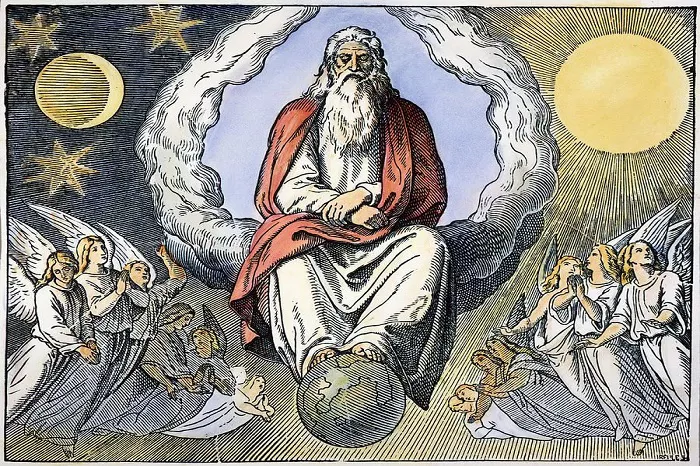Genesis 2 is a significant chapter in the Bible. It describes the completion of God’s creation. In this chapter, the phrase “God rested” appears. Understanding this phrase is essential for grasping the meaning of the Sabbath and God’s work.
The Context of Genesis 2
Creation Week
Genesis 1 describes the creation week. God creates the heavens and the earth in six days. Each day, He creates different parts of the world, culminating in the creation of humans.
Completion of Creation
Genesis 2:1-3 describes the completion of creation. These verses state that the heavens and the earth were finished. God completes His work and then rests.
The Seventh Day
Genesis 2:2-3 states: “By the seventh day God had finished the work He had been doing; so on the seventh day He rested from all His work. Then God blessed the seventh day and made it holy, because on it He rested from all the work of creating that He had done.”
Understanding “God Rested”
Resting from Work
The phrase “God rested” means that God ceased His creative work. It does not imply that God was tired. Instead, it signifies a completion and a cessation of activity.
Hebrew Word “Shabat”
The Hebrew word for rested is “shabat.” This word means to cease or to desist. It is the root for the word “Sabbath,” which becomes a key concept in the Bible.
God’s Example for Humanity
God’s rest sets an example for humanity. By resting on the seventh day, God establishes a pattern for humans to follow. This pattern becomes the basis for the Sabbath commandment.
Theological Implications of God’s Rest
Completion and Perfection
God’s rest signifies the completion and perfection of creation. Everything God made was good, and His work was complete. This completion is a key aspect of understanding God’s rest.
Holiness of the Seventh Day
God blesses the seventh day and makes it holy. The holiness of the seventh day is linked to God’s rest. This day is set apart, signifying its special status.
Sabbath and Worship
The concept of rest is tied to worship. The Sabbath becomes a day for humans to rest and to focus on God. It is a time for worship and reflection on God’s work and goodness.
The Sabbath Commandment
Exodus 20:8-11
The Sabbath commandment is found in Exodus 20:8-11. It states: “Remember the Sabbath day by keeping it holy. Six days you shall labor and do all your work, but the seventh day is a Sabbath to the Lord your God. On it you shall not do any work… For in six days the Lord made the heavens and the earth, the sea, and all that is in them, but He rested on the seventh day. Therefore the Lord blessed the Sabbath day and made it holy.”
A Day of Rest
The Sabbath commandment instructs humans to rest on the seventh day. This rest is a cessation from work, mirroring God’s rest. It is a day to focus on God and to rest physically and spiritually.
A Sign of the Covenant
The Sabbath is also a sign of the covenant between God and His people. It is a reminder of God’s creation and His relationship with humanity.
Jesus and the Sabbath
Jesus’ Teachings
Jesus teaches about the Sabbath in the New Testament. He emphasizes the Sabbath’s purpose and its role in human life. Jesus heals on the Sabbath, demonstrating its intended purpose for doing good and for mercy.
Matthew 12:8
In Matthew 12:8, Jesus declares, “For the Son of Man is Lord of the Sabbath.” This statement highlights Jesus’ authority and His interpretation of the Sabbath’s meaning.
Rest in Christ
Jesus offers a deeper understanding of rest. He invites people to find rest in Him. In Matthew 11:28-30, Jesus says, “Come to me, all you who are weary and burdened, and I will give you rest… For my yoke is easy and my burden is light.”
The Sabbath in Christian Life
A Day of Worship and Rest
For Christians, the Sabbath is a day of worship and rest. It is a time to cease from regular work and to focus on God. It is a time for spiritual renewal and reflection.
Spiritual Rest in Christ
Christians also find rest in Christ. This rest is a spiritual rest, found in a relationship with Jesus. It is a rest from striving and from the burdens of life.
The Future Rest
The concept of rest also points to a future rest. Hebrews 4:9-10 speaks of a “Sabbath rest for the people of God.” This future rest is an eternal rest in God’s presence.
Practical Applications of God’s Rest
Regular Rest
God’s rest encourages humans to take regular rest. This rest is necessary for physical, emotional, and spiritual well-being. It is a time to recharge and to reflect on God’s blessings.
Setting Aside Time for God
The Sabbath encourages setting aside time for God. In the busyness of life, it is important to have dedicated time for worship and for focusing on God.
Trusting in God’s Provision
Resting on the Sabbath is an act of trust. It is a recognition that God provides and that human efforts are not the ultimate source of provision.
See Also: What Does Exodus 12 Teach Us?
Conclusion
The phrase “God rested” in Genesis 2 has profound meaning. It signifies the completion of creation and sets a pattern for human rest. The Sabbath, rooted in God’s rest, is a day of worship and rest. It is a time to focus on God and to reflect on His work and goodness. Jesus deepens the understanding of rest, offering spiritual rest in a relationship with Him. The concept of rest also points to an eternal rest in God’s presence. As Christians, it is important to follow God’s example of rest, setting aside time for worship and trusting in God’s provision.

